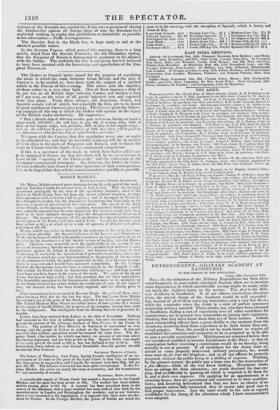The Orders in Council lately issued for the purpose of
regulating the mode in which the trade between Great Britain and the port of Canton is to be carried on, have been made the subject of a spirited article in the Courier of this evening. The writer puts the impolicy of these orders in a very clear light. One of them imposes a duty of 2s. per ton on all British ships entering canton and another a duty of 7 per cent. on the value of all goods imported into and exported from that place. From these charges, the American, Dutch, and Spanish vessels (all of which, but especially the first, are to be found in great numbers at Canton), are exempt. The Courier gives the follow- ing example of the way in which the Orders will operate to the injury of the British trader exclusively. He supposes- " That a British ship of 400 tons burden goes to Canton, having on board a cargo worth 100,0001.; she will have to pay 40/. of tonnage duty, 350/. of thity on her import cargo, and, probably, 350/. of duty on her export cargo— that is, she will have to pay a port charge of 740l. more than will be paid by cn American or other foreign ship of equal burden and value!" We agree with the Courier, that this regulation never can or ought to be submitted to ; and that its inevitable tendency will be to restrict British ships to the ports of Singapore and Batavia, and to throw the trade to Canton into the hands of our commercial competitors.
If this is a specimen of the mode in which East Indian affairs are to be managed in future, we fear that there will be DO great reason to boast of the " opening of the China trade," and the extinction of the Company's commercial monopoly. As, however, the Orders in Coun- cil have evidently been framed in utter ignorance of their consequences, it is to be hoped that they will be countermanded as speedily us possible.
















 Previous page
Previous page